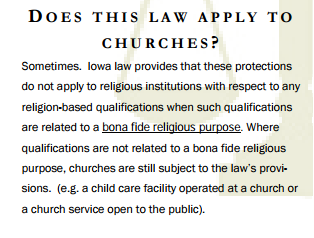Twitter was abuzz a couple of days ago with outrage over a brochure from the Iowa Civil Right Commission which provided guidance on how to comply with a 2007 change in Iowa law to forbid discrimination based on sexual orientation and gender identity. At first, I thought the law had recently been changed but later learned that the law was changed in 2007 and the brochure was first published in 2012. Here is some of the reaction. Clearly the tweeters also thought the change was recent.
“Conservatives” who supported, abetted or acquiesced to redefining marriage, please see what you helped unleash. https://t.co/IkuYHpFugI
— Robert P. George (@McCormickProf) July 5, 2016
Let me repeat, the Iowa law went into effect in 2007 and the guidance was issued in 2012. The Supreme Court’s gay marriage decision had nothing to do with Iowa’s non-discrimination law.
Here is another revelation. In the nine years the law has been on the books, not one complaint has been filed against a church. Kristin Johnson, Executive Director of the Iowa Civil Rights Commission told me, “We’ve never considered any complaint on this issue in the 9 years since the statute was amended.”
Given the urgency of the stories about the Iowa brochure, I thought the document had been recently published and the issue was new.
As it turns out, Ms. Johnson is confused about why the Alliance Defending Freedom brought a suit now. ADF did not reply to an email I sent yesterday evening. Johnson said:
We don’t know what raised this issue. This statute was amended to add these protected classes (sexual orientation and gender identity) in 2007 and has been in effect since then. The Iowa Civil Rights Commission has not done anything to suggest it would be enforcing these laws against ministers in the pulpit, and there has been no new publication or statement from the ICRC raising the issue.
As to the language in the 2012 brochure, Ms. Johnson did acknowledge ambiguity. Here is the section about churches:

The portion that is unclear is the sentence: “Where qualifications are not related to a bona fide religious purpose, churches are still subject to the law’s provisions. (e.g. a child care facility operated at a church or a church service open to the public). (emphasis added)” This makes it sound as if the Commission will enforce the law during a public church service, i.e., during Sunday or other worship services. However, Ms. Johnson told me that is not what the phrasing means. She said:
The term “Services” comes from the statute and is not intended to refer to worship or religious services. It was intended to be used in the general sense as provided in Iowa Code Chapter 216. The brochure was apparently intended to be a “FAQ” of sorts and an attempt to explain some of the legal terms. A less ambiguous way to word this might have been “services provided by a church to the public.”
“Public accommodation” means each and every place, establishment, or facility of whatever kind, nature, or class that caters or offers services, facilities, or goods for a fee or charge to nonmembers of any organization or association utilizing the place, establishment, or facility, provided that any place, establishment, or facility that caters or offers services, facilities, or goods to the nonmembers gratuitously shall be deemed a public accommodation if the accommodation receives governmental support or subsidy
The word “services” doesn’t mean worship services as is being commonly reported in press accounts of the Iowa guidance. Instead, it refers to the provision of a good or service in the economic sense. If a church allows a non-religious group to hold a bake sale or rents out a part of the building to a group that offers goods or services, the law would apply. However, using the example of a day care ministry, Ms. Johnson told me that “the question there would be whether that day care was provided by a bona fide religious institution and served a bona fide religious purpose.” On the other hand, the commission might look at the situation if a church leased their building to a day care business which operated without a bona fide religious purpose.
For some, this enforcement will still be unacceptable. In any case, the narrative that Iowa has recently initiated a move against worship services and religious freedom in church just doesn’t match up with the facts.